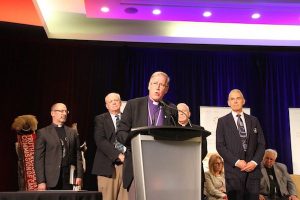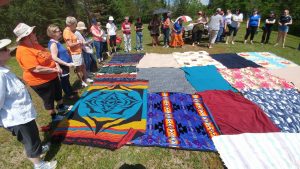Healing and Reconciliation Efforts
By the early 1990s, Residential School Survivors began to speak publicly about experiencing abuse in the schools. In 1998, the first lawsuit was filed against The Presbyterian Church in Canada from a former Residential School student. By 2003, the Church was faced with 246 lawsuits. The Presbyterian Church sought to renew its relationship with Indigenous peoples and was committed to seeking ways to walk with them towards healing and wholeness. The Church entered bi-lateral negotiations with the Government of Canada, and established a Settlement Agreement in 2002 which set the financial liability for the Presbyterian Church at $2.1 million. This agreement was rolled into the Indian Residential Schools Settlement Agreement in 2007, which included The United Church of Canada, The Anglican Church of Canada, and the Roman Catholic Church Entities.
In 2006, the General Assembly approved the Walking Together plan to support and seed funding for local healing and reconciliation initiatives. One way this plan has been implemented is through the creation of the Healing and Reconciliation Seed Fund in 2007. This fund offers grants of up to $5,000 to Presbyterian groups in support of initiatives that build relationships between Indigenous and non-Indigenous peoples. Since then, the Church has engaged in numerous other reconciliation initiatives. In 2008, the Presbyterian Church held its first local leader training workshop for Presbyterian leaders of congregations, presbyteries, and communities. As part of the workshop, leaders learn about the history of Residential Schools, The Presbyterian Church in Canada’s involvement in these schools and its commitment to reconciliation. That same year, the Presbyterian Church established the Healing and Reconciliation Native Ministries Fund to support healing efforts from Presbyterian ministries that operate for and within Indigenous communities. To date, there are nine Indigenous Ministries: Anamiewigummig Fellowship Centre in Kenora, Ontario; Winnipeg Inner City Missions in Winnipeg, Manitoba; Saskatoon Native Circle Ministry in Saskatoon, Saskatchewan; Mistawasis Memorial Presbyterian Church in Mistawasis First Nation, Saskatchewan; Place of Hope Indigenous Presbyterian Church in Winnipeg, Manitoba; Edmonton Urban Native Ministry in Edmonton, Alberta; Nazko & Area Dakelh Outreach in Cariboo Region, British Columbia; Hummingbird Ministries in Vancouver, British Columbia; and Cedar Tree Ministries (CTM) in Duncan, British Columbia. These ministries comprise the National Indigenous Ministry Council and meet with each other to cultivate mutual support, education, and discussion.
As part of the Indian Residential School Settlement Agreement, the Truth and Reconciliation Commission of Canada (TRC) was formed to hear testimonies from Residential School Survivors and review documentation related to the Residential School system. Between the years 2010-2015, The Presbyterian Church in Canada participated in all of the national TRC events, which were held in Winnipeg, Manitoba; Inuvik, Northwest Territories; Halifax, Nova Scotia; Saskatoon, Saskatchewan; Montreal, Quebec; Vancouver, British Columbia; Edmonton, Alberta; and Ottawa, Ontario. In 2015, the TRC announced its 94 Calls to Action to redress the legacy of Residential Schools. The Calls to Action directed recommendations to all parties of the Settlement Agreement. It also encouraged churches, governments, businesses, and Canadian society as a whole to recognize the legacy of Residential Schools and commit to reconciliation efforts.

Response of the Churches to the Truth and Reconciliation Commission of Canada. The Rev. Dr. Stephen Farris, Moderator of the PCC, is second from left.
On 2 June 2015 the parties of the Settlement Agreement – The Presbyterian Church in Canada, The Anglican Church of Canada, The United Church of Canada and the Roman Catholic Entities – along with the Jesuits of English Canada, made a joint response to the findings and Calls to Action issued by the TRC. This response was signed by Archbishop Fred Hiltz of The Anglican Church of Canada; Rev. Dr. Stephen Farris, Moderator of The Presbyterian Church in Canada; Archbishop Gerard Pettipas, President of Catholic Entities Parties to the Indian Residential School Settlement; The Right Reverend Gary Paterson, Moderator of The United Church of Canada; and Peter Bisson, SJ of Jesuits of English Canada. The full response from these Churches can be found on The Presbyterian Church in Canada website.
We are grateful to the Survivors, whose courageous witness has touched the heart of the life of our churches. There have been apologies from our churches, yet we know that our apologies are not enough. And so we are grateful as well to the Commissioners of the Truth and Reconciliation Commission for their findings and for their clarity about our continuing responsibilities.
– Response of the Churches to the Truth and Reconciliation Commission of Canada, 2015
The Presbyterian Church in Canada is committed to responding to the TRC’s Calls to Action. There are several Calls to Action that are directed to churches. A breakdown of these Calls to Action can be found on The Presbyterian Church in Canada website, they include the following topics: respecting Indigenous spiritual traditions, teaching the history and legacy of Residential Schools, and funding Indigenous healing and reconciliation. In response to these Calls to Action, the Presbyterian Church has engaged in a number of initiatives to foster greater healing and reconciliation. The Presbyterian Church acknowledges traditional territory that is used for worship, meetings and other gatherings. The Church advocates for the implementation of the United Nations Declaration on the Rights of Indigenous Peoples into Canadian law and is considering how to adopt the declaration into its own structures and policies. Justice Ministries regularly facilitates training opportunities for Presbyterians to learn more about the history of the Church’s relationship with Indigenous peoples and how they can be part of reconciliation in their communities. This includes the KAIROS Blanket Exercise, which is an experiential learning activity that helps participants develop a deeper understanding of how colonization and loss of land have impacted, and continue to impact, Indigenous peoples. The KAIROS Blanket Exercise was developed through a partnership between The Presbyterian Church in Canada and KAIROS: Canadian Ecumenical Justice Initiative.
